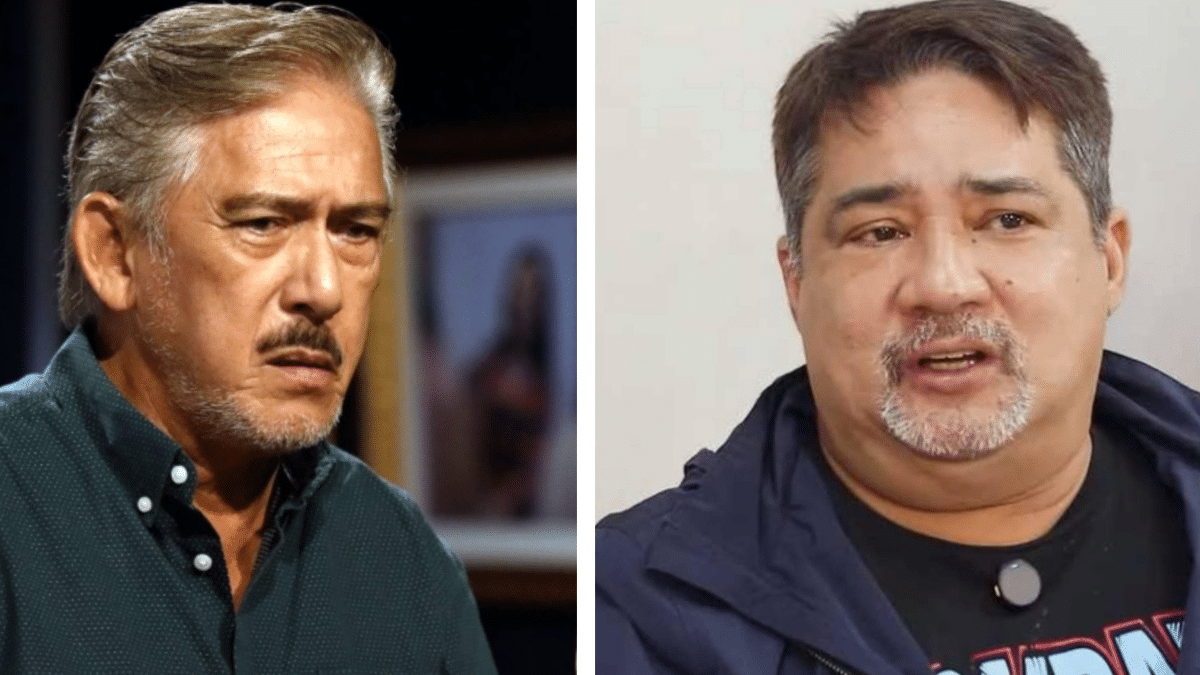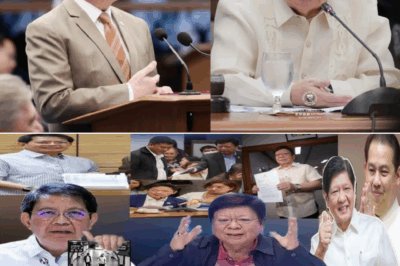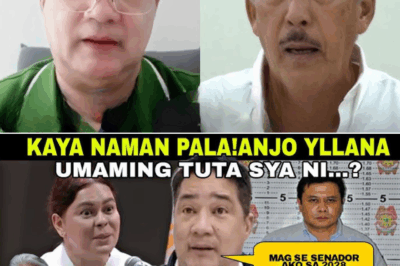What started as a string of emotional online rants may now lead to a serious legal battle. Former Eat Bulaga! host Anjo Yllana is under fire after publicly making bold accusations against Senator Tito Sotto and his brother, Vic Sotto—claims that, if proven false, could land him in hot water under the country’s cyber libel laws.
In recent weeks, videos of Yllana have spread rapidly across TikTok and Facebook. In these clips, the once-popular comedian-turned-politician made shocking statements, alleging dark secrets and scandals involving the Sotto brothers and the long-running noontime show Eat Bulaga!. He even mentioned personal issues such as alleged affairs and internal misconduct within the show’s management—claims that stunned fans and dismayed colleagues.

The controversy has reignited public debate about how far “freedom of speech” can go in the age of social media. For many viewers, Yllana’s statements were not mere venting—they were serious allegations directed at respected public figures. And under Philippine law, that can have severe consequences.
Understanding the Law: What is Cyber Libel?
According to the Cybercrime Prevention Act of 2012 (Republic Act No. 10175), cyber libel occurs when someone posts or publishes online any statement that damages the reputation or dignity of another person. The law covers posts, videos, or comments on any digital platform—including Facebook, TikTok, and YouTube.
If proven guilty, the accused can face imprisonment of up to six years or more and be required to pay substantial fines and damages. The law applies to everyone, whether you’re a private citizen, influencer, or celebrity.
“People tend to think social media is a free zone,” said one legal analyst. “But once you name names and accuse someone of wrongdoing without solid proof, you’re already walking on dangerous ground.”
Why Anjo’s Case Could Turn Serious
Legal experts say that Yllana’s videos fall squarely under the definition of public communication. His accusations—naming Senator Tito Sotto and Vic Sotto directly and suggesting illicit relationships and alleged syndicate activities within Eat Bulaga!—were made before a massive online audience.
If the Sottos or their representatives decide to pursue legal action, Yllana would have to present concrete evidence to prove that every statement he made was true. And that’s where the challenge lies.
“In libel cases, the burden of proof is on the person who made the claim,” a lawyer explained. “You can’t just say something damaging and expect to get away with it by calling it your opinion. You need evidence—documents, witnesses, or records—to back it up.”
Should he fail to do so, Yllana could be found guilty of cyber libel and ordered to pay both criminal penalties and civil damages. The damages alone—particularly if the Sottos claim moral or emotional harm—could reach millions of pesos.
From Screen to Courtroom
The irony isn’t lost on the public: a man who once brought laughter to Filipino households now faces the possibility of standing trial for words that caused harm. Yllana and the Sotto brothers worked side by side for over twenty years on Eat Bulaga!, building a relationship that many fans believed was built on trust and camaraderie.
That’s why the fallout has been especially painful to watch. What once was a team that shared laughter on national television now finds itself entangled in bitterness and public humiliation.
But beyond the emotional drama, the law is clear—friendship offers no immunity. If the Sottos file a complaint, the Department of Justice could investigate whether Yllana’s statements meet the legal standards for libelous speech.
Freedom of Speech Has Limits
Many supporters of Yllana argue that he’s simply exercising his right to free speech. While that right is protected by the Constitution, it’s not absolute. The moment speech crosses into defamation—statements that harm another person’s honor, integrity, or reputation—it becomes a legal matter.
Social media has made it incredibly easy for emotions to spill out into the public domain. But as one legal commentator pointed out, “The internet is not a courtroom where you can freely accuse people without consequence. What you post can be used as evidence against you.”
Even statements made “in the heat of emotion” can still qualify as cyber libel if they’re proven to have caused reputational damage. The law does not recognize anger or frustration as valid excuses.
The Cost of Going Public
Aside from potential jail time, Yllana could face serious financial setbacks. Legal experts warn that even if a criminal case doesn’t result in conviction, a separate civil case could still require him to compensate the Sottos for emotional distress or reputational harm.
“Moral damages can be huge in cases involving public figures,” one attorney noted. “If the court determines that the false statements caused humiliation or distress, the penalties can run into millions.”
Considering Yllana’s current career status, this kind of legal battle could be financially devastating. The expenses alone—lawyers, hearings, and potential settlements—can cripple anyone not prepared for a prolonged courtroom fight.

A Cautionary Tale for Everyone
Whether or not the Sottos decide to pursue charges, Yllana’s story serves as a sobering reminder for all social media users. In the digital age, one impulsive post or angry livestream can destroy reputations and trigger real-world legal consequences.
It’s easy to forget that what happens online doesn’t stay online. Once something is published, it can be shared, recorded, or screenshot by thousands—making it almost impossible to take back.
As legal experts put it, “The internet has no delete button.”
From Comedian to Controversy
Anjo Yllana’s downfall seems to have come from the very platform that once promised him connection with fans. While social media gave him a voice, it also amplified his mistakes. What may have started as an attempt to express hurt feelings has now spiraled into a potential criminal case.
For the public, this is more than just a celebrity feud—it’s a lesson in accountability. No matter who you are or how big your following is, words have weight.
The Bottom Line
The once-lighthearted entertainer now finds himself at the center of a legal storm, his every word dissected and replayed online. If he cannot prove the truth behind his allegations, he risks not just his reputation but also his freedom.
And while some still sympathize with his pain, most agree on one thing: the moment you go public with accusations without proof, you must be ready to face the consequences.
In a world where one post can reach millions in seconds, Anjo Yllana’s case stands as a powerful warning—freedom of speech may be free, but irresponsibility comes at a price.
News
Senate Invites Romualdez as Flood Control Scandal Explodes; Sotto Caught in Personal Controversy and Malacañang Responds to Online Feud
The political scene in the Philippines has once again erupted into chaos—this time, a combination of explosive corruption allegations, emotional…
Senator Ping Lacson Drops Bombshell: Exposes CCTV Evidence and Major Flood Control Scandal Tied to Lawmakers
The halls of the Senate erupted with tension this week as Senator Ping Lacson took center stage, unveiling what he…
Anjo Yllana’s Explosive Tirades Against Tito Sotto: What Really Drove the Former “Eat Bulaga” Host to Turn Against His Longtime Friend
For two decades, Anjo Yllana was a familiar face in Filipino homes—a comedian, actor, and beloved host on the legendary…
Ria Atayde at Zanjoe Marudo, Tuluyang Naghiwalay Matapos ang Matagal na Pagsubok sa Kanilang Relasyon
Isang Nakakalungkot na Balita sa Mundo ng ShowbizIsang matinding balita ang kumalat kamakailan sa industriya ng showbiz—ang relasyon nina Ria…
Daniel Padilla at Kyla Estrada, Spotted Magkasama sa Publiko — Netizens Kinilig, Katniel Fans Nagulat sa Hard Launch ng Bagong Relasyon
Sa gitna ng Halloween season, tila hindi takot kundi kilig ang hatid ng pinakabagong usap-usapan sa showbiz—ang rumored couple na…
Misteryong Hindi Malutas: Ang Pagdukot sa Anim na Magkakaibigan sa Batangas na Hanggang Ngayon ay Walang Hustisya
Isang bakasyon na dapat ay puno ng saya at tawanan ang nauwi sa trahedya at misteryo. Apat na taon na…
End of content
No more pages to load












